地球流体セミナー/
Workshop on Climate Modeling and Satellite Observations
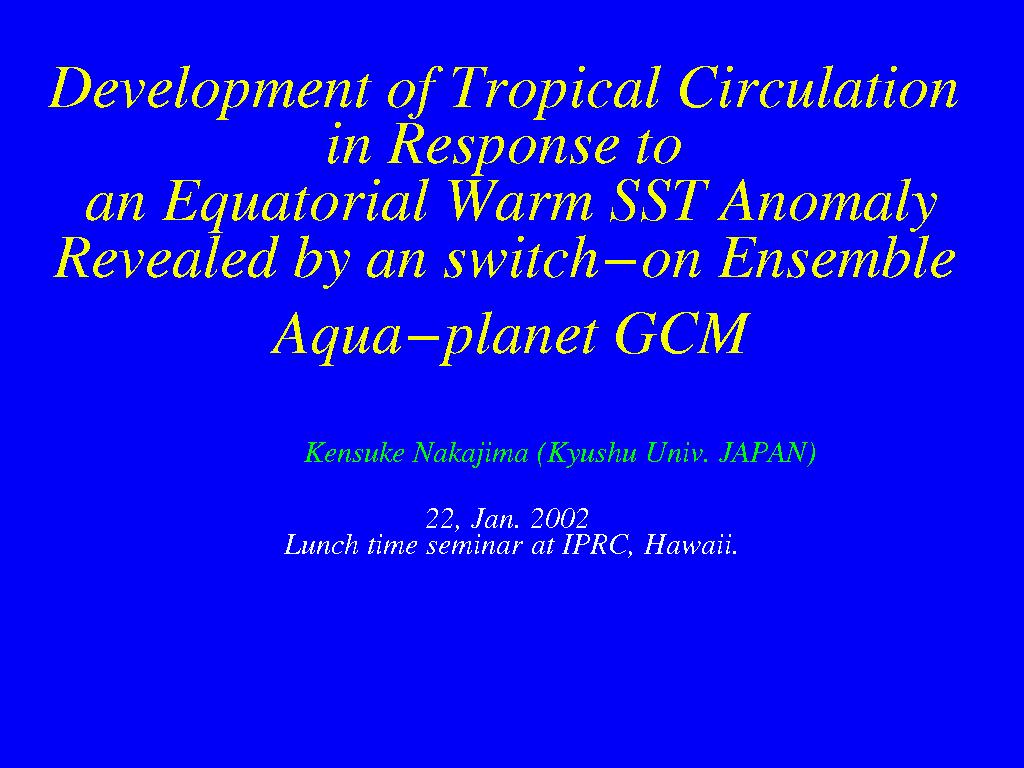
|
Development of Tropical Circulation
in Response to an Equatorial Warm SST Anomaly
Revealed by an switch-on Ensemble Aqua-planet GCM
九州大学 大学院 理学研究院
地球惑星科学部門
中島 健介
[email protected]
2002 年 1 月 20 日
|
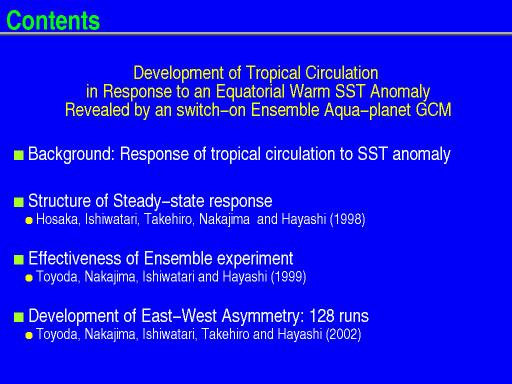
|
目次
|
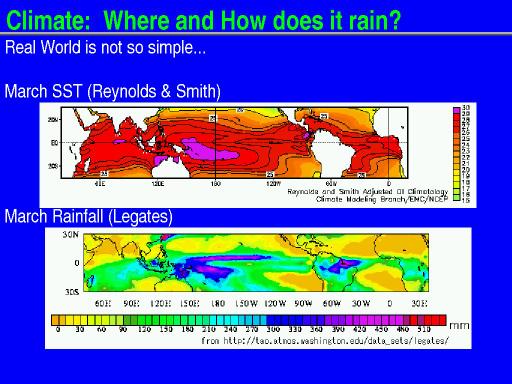
|
問題意識: どこで雨が降るのか?
- 第 0 近似では "SST の高いところで雨が降る"
- よくみると必ずしもそうではないことがわかる
|
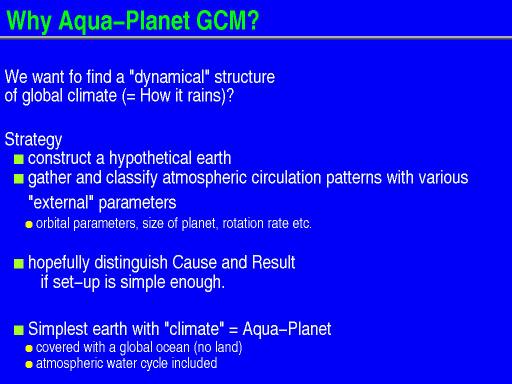
|
基本的な方針: 水惑星 GCM を用いる
|
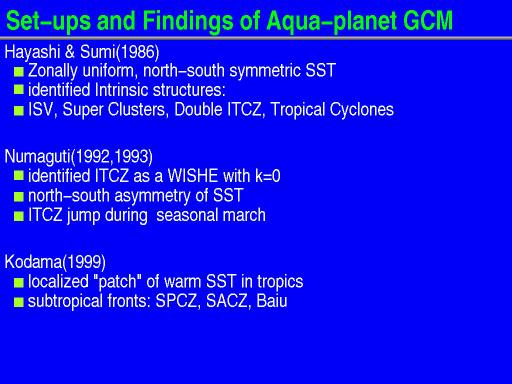
|
水惑星 GCM 研究の流れ
|
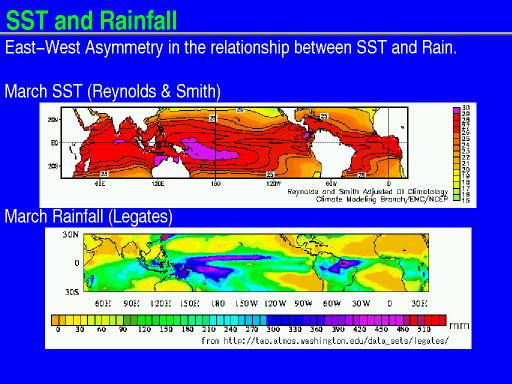
|
SST 分布にたちもどってみると…
- 東西に非一様がある.
- 大気循環どのような影響があるのか?
|
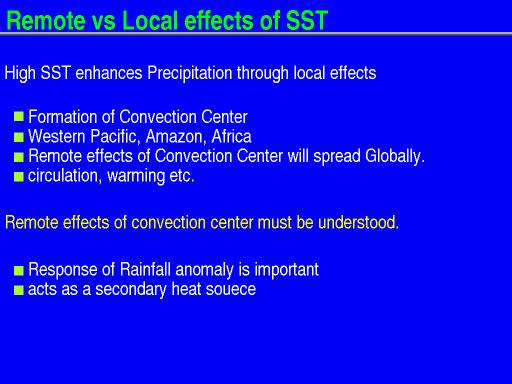
|
SST 分布の大気循環への影響
|
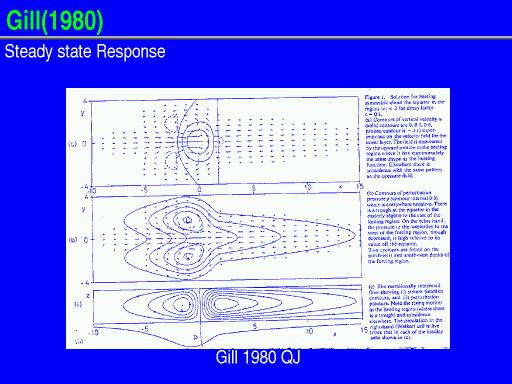
|
Gill (1980) の結果
|
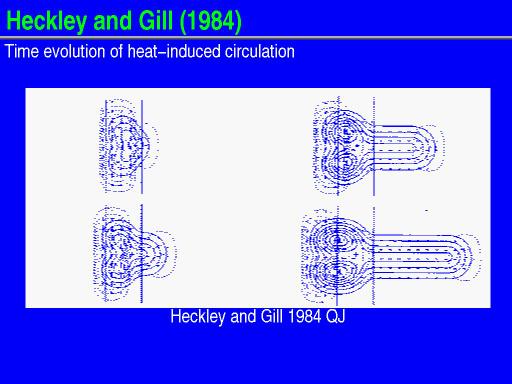
|
Heckley and Gill (1984) の結果
|
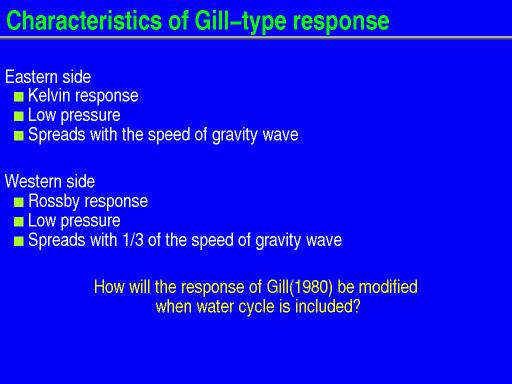
|
問題意識: 湿潤過程を陽に考慮すると Gill (1980) の結果は変わるか?
|
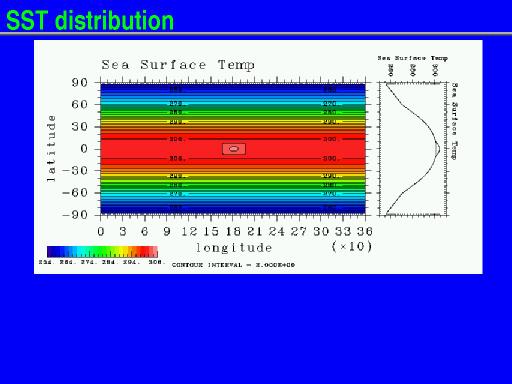
|
実験で与える SST 分布
- 赤道中心に周囲から 4 K 高い領域を置く
- 西太平洋暖水域を想定
|
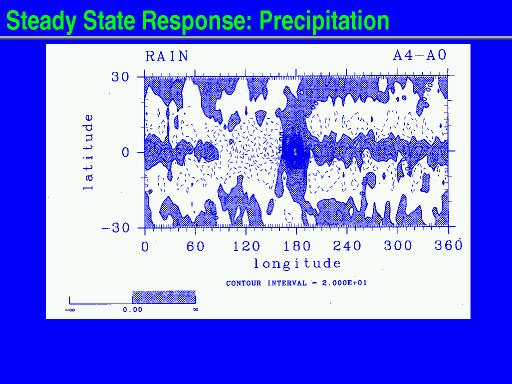
|
計算結果: 降水分布 (長時間積分後)
|
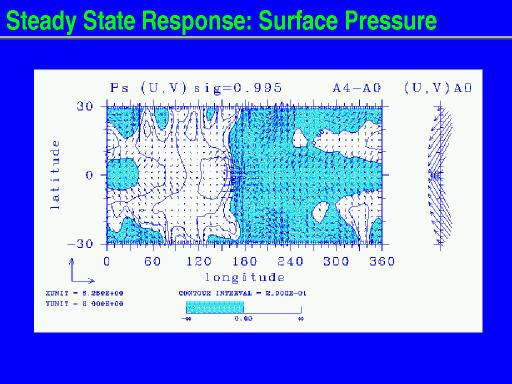
|
計算結果: 地表気圧 (長時間積分後)
|
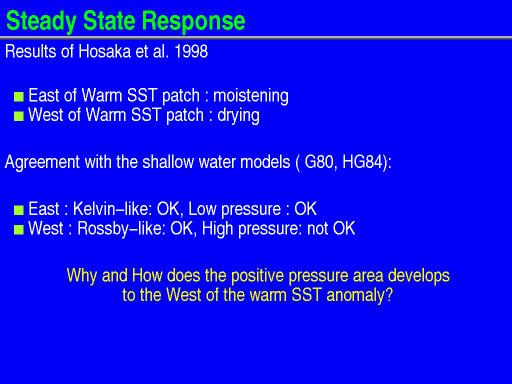
|
SST パッチに対する定常
- 暖水域東側: ケルビン応答がはっきりみえる
- 暖水域西側: ロスビー応答 ?
|
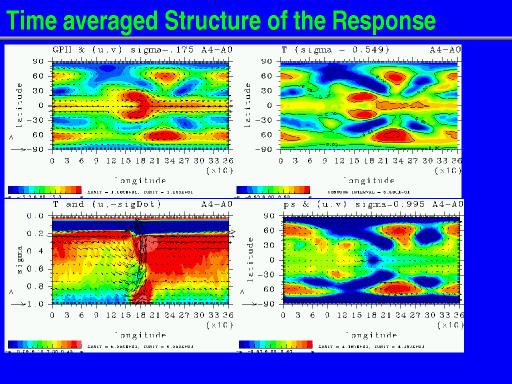
|
時間平均場の構造
|
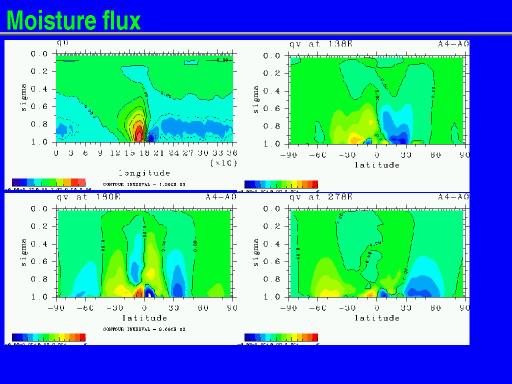
|
水蒸気フラックスの水平鉛直分布
|
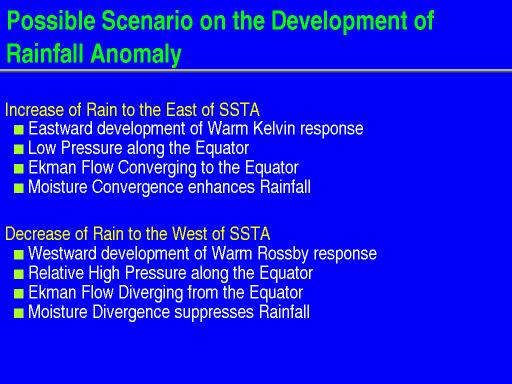
|
定常応答実験のまとめ
|
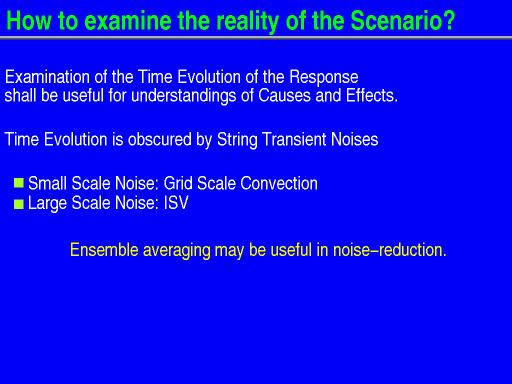
|
暖水域に対する応答が形成される様子をみるには?
- 単一の実験結果からでは情報を取り出しにくい
- 初期条件をちょっとずらした多数の実験を平均してみる(アンサンブル実験)
|
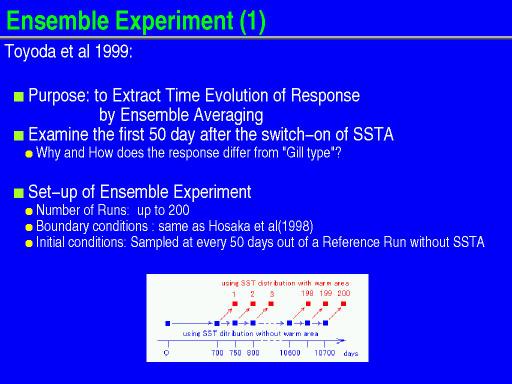
|
アンサンブル実験(1)の概要
|
アンサンブル実験(1)結果
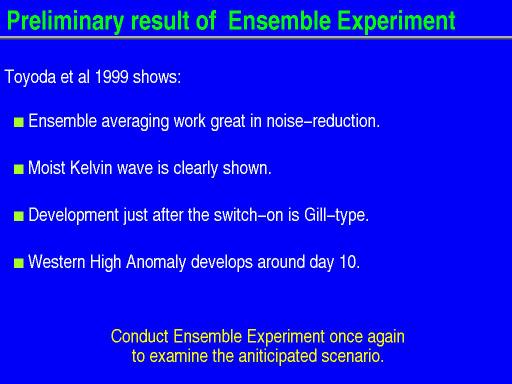
|
アンサンブル実験(1)のまとめ
- ケルビン応答はよくみえる. 一度降水が減ってその後増える.
- ケルビン応答の位相速度は dry なケルビン波よりも遅い.
- ロスビー応答はやはりはっきりとは見えない.
- 暖水域の西側は乾燥化する.
|
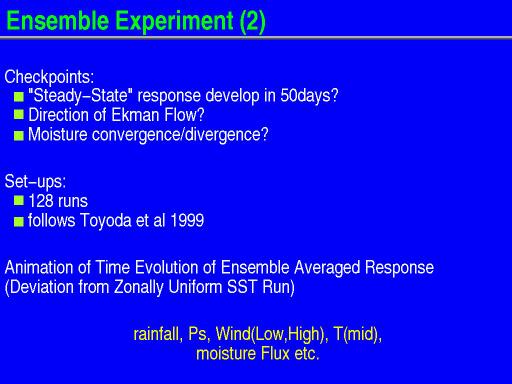
|
もう一度アンサンブル実験
|
アンサンブル実験(2)結果
アンサンブル実験(2)結果 (movie)
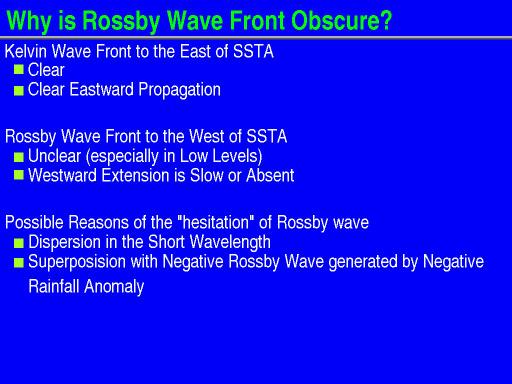
|
アンサンブル実験(2)まとめ
- ケルビン応答ははっきりみえるがロスビー応答は止まってしまう.
- なぜロスビー応答ははっきりみえないか?
- 暖水域による加熱によって生じるロスビー波を
乾燥化にともなう冷却によって生じるロスビー波が打ち消す.
- 暖水域のスケールが小さいことによる赤道ロスビー波の分散性:
波長の短いロスビー波の群速度は東向き.
- Gill は長波近似を行っている.
Heckley and Gill を長波近似しない再計算結果は
こちら
|
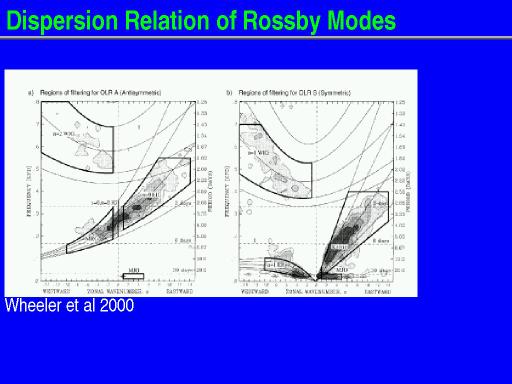
|
ロスビー波の分散性
|
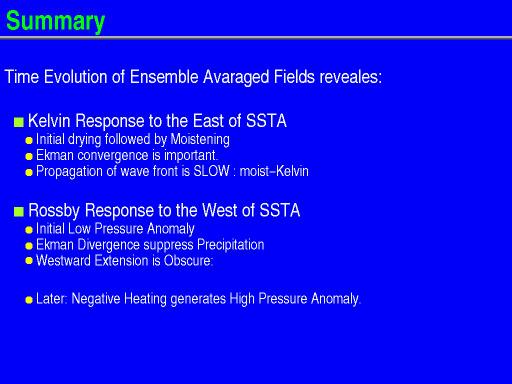
|
まとめ
|
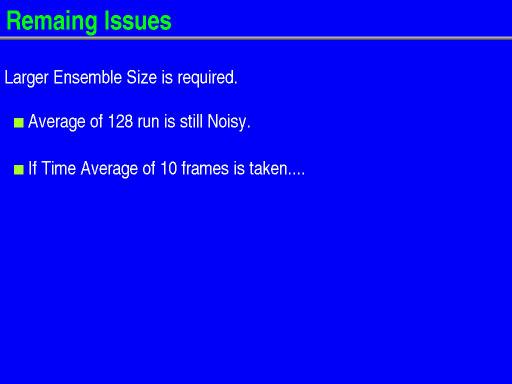
|
問題点
|
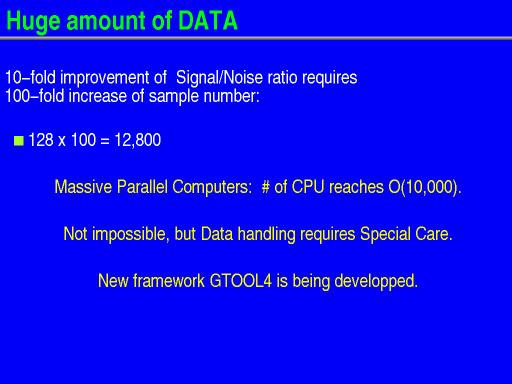
|
問題点
|
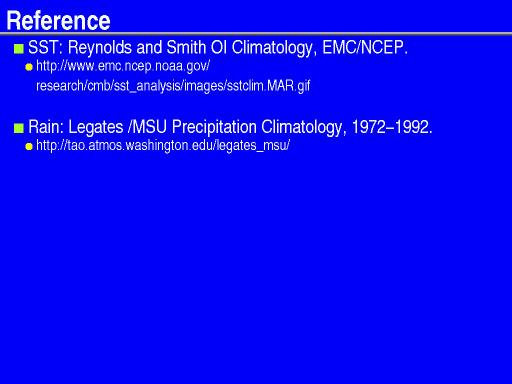
|
参考文献
|
参考文献
- Gill, A. E., 1980:
Some simple solutions for heat-induced tropical circulation.
Quart. J. Roy. Meteorol. Soc., 106, 447-462.
- Heckley, W. A., and A. E. Gill, 1984:
Some simple analytical solutions to the problems of
forced equatorial long waves.
Quart. J. Roy. Meteorol. Soc., 110, 203-217.
- Hayashi, Y.-Y. and A. Sumi, 1986:
The 30-40 day oscillations simulated in an ``aqua planet'' model.
J. Meteor. Soc. Japan, 64, 451-467.
- Hosaka, M., M. Ishiwatari, S. Takehiro, K. Nakajima, and
Y.-Y. Hayashi, 1998:
Tropical precipitation patterns in response to a local warm
SST area placed at the equator of an Aqua planet.
J. Meteor. Soc. Japan, 76, 289-305.
- Numaguti, A., and Y.-Y. Hayashi, 1991:
Behavior of cumulus activity and the structures of
circulations in an aqua planet mode. 2. Eastward-moving
planetary scale structure and the intertropical convergence
zone. J. Meteor. Soc. Japan, 69, 563-579.
- Numaguti, A., 1992: Numerical experiments on the large scale
structure of cumulus activity in the tropics. Ph.D. Thesis,
University of Tokyo. (in Japanese).
- Numaguti, A., 1993:
Dynamics and energy-balance of the Hadley circulation and the
tropical precipitation zones - significance of the
distribution of evaporation.
J. Atmos. Sci., 50, 1874-1887.
- Kodama, Y. M., 1999: Roles of the atmospheric heat sources in
maintaining the subtropical convergence zones: An aqua-planet
GCM study. J. Atmos. Sci., 56, 4032-4049.
- Takayabu, Y. N., 1994:
Large-scale cloud disturbances associated with equatorial waves.
1. Spectral features of the cloud disturbances,
J. Meteor. Soc. Japan, 72, 433-449.
- Takayabu, Y. N., 1994:
Large-scale cloud disturbances associated with equatorial waves.
2. Weastward-propagating inertio-grabity waves,
J. Meteor. Soc. Japan, 72, 451-465.
- Toyoda, E., K. Nakajima, M. Ishiwatari, and Y,-Y. Hayashi, 1999:
Response of the tropical atmosphere to a localized warm SST
area: Time-development observed in an aqua-planet ensemble
experiment. Nagare Multimedia
http://www.nagare.or.jp/mm/99/toyoda/.
- Wheeler M, G. N. Kiladis, and P. J. Webster, 2002:
Large-scale dynamical fields associated with convectively coupled
equatorial waves, J. Atmos. Sci., 57, 613-640.
- TRMM: http://www.eorc.nasda.go.jp/TRMM/Gallery/tev/pdf/tev_11.pdf
Odaka Masatsugu
2002-01-20
|